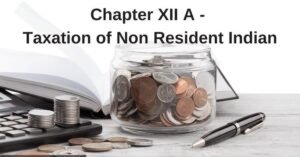The Income Tax Act provides several special provisions for different businesses, and one such provision is the tonnage tax scheme under Chapter XII-G, which is applicable to companies operating qualifying ships. Section 115VL specifically outlines the general exclusion of deductions and set-off in computing the tonnage income of a tonnage tax company. In this blog, we will explore the detailed nuances of this section and how it affects the taxation of shipping companies.
What is the Tonnage Tax Scheme?
Before diving into Section 115VL, it’s important to understand the tonnage tax scheme. The tonnage tax scheme allows companies operating qualifying ships to compute their income based on the net tonnage of their ships rather than the actual income or profit from operations. This scheme simplifies taxation for shipping companies and is aimed at boosting the maritime industry in India.

Key Highlights of Section 115VL
Section 115VL outlines the rules for calculating tonnage income and restricts certain deductions and losses that would otherwise be available under normal tax provisions. Here’s how it works:
1. Exclusion of Sections 30 to 43B Losses and Deductions
In a tonnage tax company, sections 30 to 43B of the Income Tax Act, which generally allow for deductions relating to repairs, depreciation, and other expenses, will apply as if all losses and deductions have been fully utilized within the relevant previous year itself. This means:
- Any losses, allowances, or deductions relating to the relevant previous years cannot be carried forward or deferred.
- The company cannot make adjustments for those losses or deductions in future years under the tonnage tax regime.
2. No Carry Forward or Set-Off of Losses
Section 115VL places strict restrictions on carrying forward losses related to the business of operating qualifying ships. Specifically, the following losses cannot be carried forward or set-off:
- Losses under Section 70(1) and 70(3): These sections deal with setting off losses from one source of income against another.
- Losses under Section 71(1) and 71(2): These sections relate to setting off losses from one head of income against another, such as setting off business losses against income from capital gains.
- Losses under Section 72 and 72A: These sections permit the carry forward of business losses for set-off in future years.
If the loss relates to the business of operating qualifying ships, it cannot be carried forward for future set-offs if it was incurred while the company was under the tonnage tax scheme.
3. No Deduction under Chapter VI-A for Profits from Qualifying Ships
Another significant restriction is that no deductions under Chapter VI-A can be claimed concerning the profits from the business of operating qualifying ships. Chapter VI-A includes deductions such as Section 80C (savings-linked deductions) and Section 80G (donations to specified funds). Therefore, profits from qualifying ships are exempt from these deductions, ensuring that income from qualifying ships is computed solely under the tonnage tax system.
4. Computation of Depreciation Under Section 32
Depreciation is typically a major deduction for businesses, and it helps reduce taxable income. Under the tonnage tax scheme, depreciation is calculated differently. Section 115VL(4) clarifies that in computing the depreciation allowance under Section 32:
- The written down value (WDV) of any asset used for the tonnage tax business shall be calculated as if the company has already claimed and been allowed the deduction for depreciation in previous years.
- Even if the company did not claim depreciation in earlier years, it is assumed that the deduction was allowed, ensuring that the WDV is appropriately reduced.
Why the Exclusion of Deduction and Set-Off?
The tonnage tax scheme is designed to simplify the taxation process for shipping companies by providing a flat rate of taxation based on the tonnage capacity of ships rather than the actual profits or losses from operations. The restrictions in Section 115VL ensure that companies under this scheme cannot benefit from the typical tax deductions, set-offs, and loss carry-forwards available to other businesses.
This exclusion creates a clean slate for tonnage tax companies, where their income tax is based purely on the net tonnage of their qualifying ships. This simplicity is beneficial for companies that have variable income or expenses and prefer a predictable tax regime.
Impact on Tonnage Tax Companies
For companies operating qualifying ships, the impact of Section 115VL can be substantial:
- No Losses Carry Forward: If a company incurs losses in a year when it is under the tonnage tax scheme, it cannot carry those losses forward to future years. This could lead to higher taxable income in future years when the company returns to profitability.
- Simplified Taxation: On the other hand, the tonnage tax scheme simplifies income computation, offering predictability in tax liability. The tonnage tax scheme also eliminates the need for extensive bookkeeping related to losses and deductions.
- No Depreciation Manipulation: The assumption that depreciation has been claimed and allowed ensures that companies cannot manipulate the system by deferring depreciation deductions to later years. This also simplifies the calculation of the WDV of assets for future years.
FAQs
1. What is the tonnage tax scheme?
The tonnage tax scheme allows shipping companies to compute their income based on the tonnage capacity of their qualifying ships, providing a simplified and predictable tax regime.
2. Can losses from the business of operating qualifying ships be carried forward under the tonnage tax scheme?
No, under Section 115VL, losses related to the business of operating qualifying ships cannot be carried forward or set-off.
3. Are companies under the tonnage tax scheme allowed to claim deductions under Chapter VI-A?
No, companies under the tonnage tax scheme cannot claim deductions under Chapter VI-A, such as deductions for savings or donations.
4. How is depreciation calculated for companies under the tonnage tax scheme?
Depreciation is calculated as though the company has already claimed and been allowed the deduction for previous years, even if they have not. This ensures that the written-down value of assets is accurately computed.
For more insights on tax provisions and expert guidance, visit SmartTaxSaver.
Conclusion
Section 115VL of the Income Tax Act plays a vital role in shaping how companies under the tonnage tax scheme are taxed. By excluding common business deductions, losses, and set-offs, it ensures a straightforward and predictable tax regime for shipping companies. For companies that rely on qualifying ships, the tonnage tax scheme offers a significant benefit in terms of simplified taxation. However, it also means that traditional tax-saving methods, such as carrying forward business losses or claiming deductions under Chapter VI-A, are not available.
If your company is involved in the shipping business and you are considering the tonnage tax scheme, it’s essential to carefully weigh the benefits and drawbacks of Section 115VL. The exclusion of deductions and set-offs could impact your overall tax liability, but the predictability and simplicity of the tonnage tax scheme may outweigh these limitations.



